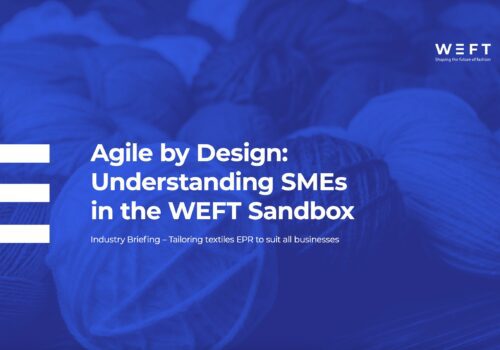Creating a fair, industry-led EPR system
UKFT is closely exploring the implications of extended producer responsibility (EPR) for the UK fashion and textile industry and to incentivise circular economy principles across the supply chain.
This included the EPR data sandbox project, which saw UKFT work with partners including QSA Partners, the British Fashion Council (BFC), the University of Exeter with support from the British Retail Consortium (BRC), and funding from Innovate UK’s NICER programme ‘Circular Economy for SMEs’.
The UK Government has indicated its intention to create an “Extended Producer Responsibility” (EPR) scheme for fashion and textile products. EPR is currently in place for packaging, e-waste and batteries – but all these systems were created before the advent of large-scale data systems. This project is unique because it aims to use industry data to develop a fair and level playing field for all companies making and selling clothing and textiles in the UK, and potentially create funds for supporting the development of world-leading recovery, sorting, reuse and recycling of clothing and textiles.
The partners explored the use of an industry-led EPR system that incentivises circular economy principles across the supply chain and will enable a step-change in the adoption of circular approaches. Applicable to all supply chain players, the system aims to focus on fairly incentivising the reuse, refurbishment and resale of textile products.
It aims to create a market-based EPR system that is dynamic, flexible and adapts to the emergence of new technologies, retail systems and consumer behaviour. It will work with a range of garment producers and assess garment level data (such as fibre composition, fibre type) to understand the potential levers for different EPR mechanisms and how these impact different parts of the supply chain.
Gerrard Fisher from QSA said: “The [EPR data sandbox] project is looking at a radical and innovative approach to market data collation; any future EPR system needs to drive incentivisation to switch to circular options and disincentivise linear systems.”
Adam Mansell, CEO of UKFT, and chair for the project, added: “The future EPR system must accommodate all supply chain players that we have in abundance in the UK. To have a system that can bring all these players together and make positive and proactive improvements to the UK economy is paramount.”
The brands participating in the first phase of the project included Marks & Spencer and John Smedley, among others. A second phase of the project included small to medium sized businesses including Erdem, Abraham Moon and TBCo.
A spokesperson for M&S said: “At M&S we’ve been sourcing and making products with care so they’re too good to waste right since our very beginning. Today our approach to circularity is focused on promoting innovation, collaborative working and increasing our use of recycled fibres. This industry-led project both supports and challenges our Plan A roadmap, so we can ensure our products remain of the highest quality, last the test of time and really are too good to waste.”
A spokesperson for John Smedley added: “This is an opportunity for the textile industry to stay ahead of legislative action and make the process meaningful and applicable to all those companies that are wanting to be responsible for process, product and planet.”
More details

New research on UK consumer views on EPR visible fees
UK consumers are supportive of visible Extended Producer Responsibility (EPR) charges on clothing to boost recycling and promote sustainable fashion
Find out more
SME report: Tailoring textiles EPR to suit all businesses
A new report from WEFT shares insights from a group of small and medium-sized UK fashion and textile businesses that took part in the Extended Producer Responsibility (EPR) Data Sandbox project
FIND OUT MORE
Industry calls on Government to step-up on variable EPR fees for clothing and textiles
An industry-backed White Paper urges the Government to implement variable Extended Producer Responsibility (EPR) fees immediately to drive sustainability and establish a circular economy in the UK fas
FIND OUT MORE